Description and maintenance of Devon Rex cats
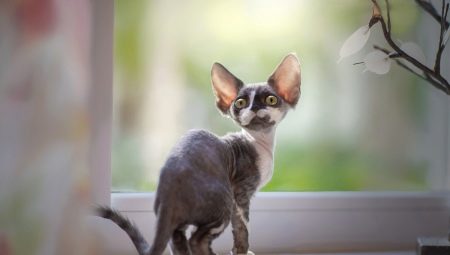
Devon Rex is an amazing breed of cats with an extraordinary exterior and a unique texture of wool. Despite its low prevalence among Russian breeders, this breed is distinguished by a calm, peaceful and inquisitive character, and also does not require special care. The article will consider in detail the description and maintenance of Devon Rex cats, as well as give tips and advice on feeding and breeding these pets.
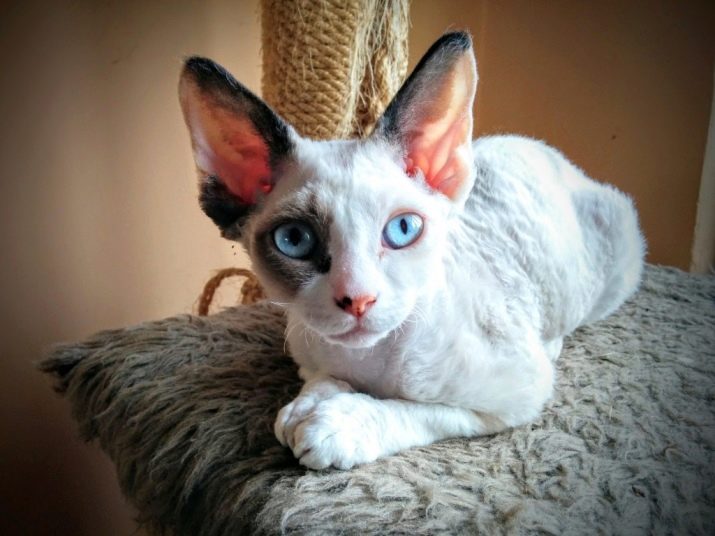
Origin story
The historical homeland of these extraordinary cats is considered to be the county of Devonshire in the territory of South-West England. Around the 1960s, a cat with an amazing appearance for that time was seen in these lands. The animal managed to hide from people due to its extraordinary speed, but the female, which traveled with it, was able to take it to the farm. In the near future she lambed, and among the kittens there was one unusual dark baby with short and curly hair.
The cat was named Kirley, and its owner decided that he was a representative of a rare breed of Cornish Rex. The kittens of the animals had approximately the same conformation, profile and long, thin legs. With the growing up of the cat, the owner had the idea to start breeding the breed, but mating the pet with her relatives did not give any result. They were still the most ordinary cats without the coveted curls in their hair and big ears.
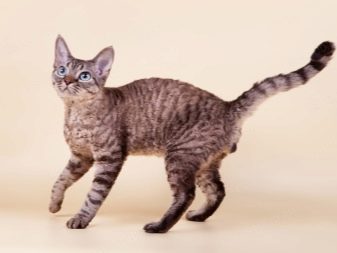
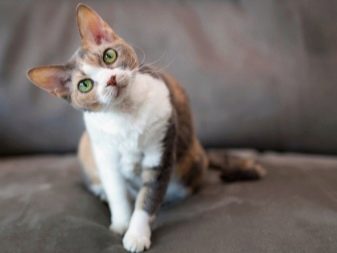
At this time, there was a real crisis among the entire Rex breed - there were fewer and fewer individuals, and few breeders wanted to acquire them. However, several breeders have managed to preserve the varieties. Crossing Kirley with these representatives did not give any results, however, in the course of breeding research with an ordinary domestic cat, kittens with the desired type of coat, eyes and ears soon appeared.
Only in the second half of the 20th century did the Devons emerge as a full-fledged breed (in the USA), and already in 1972 some individuals won champion status. High performance and official recognition have done their job - Devon Rex increasingly began to appear in homes and nurseries, many American and British families became interested in them. The population of these cats is currently negligible due to low fertility and many flaws in the born individuals. Large nurseries regularly decide on the crossing of individuals of this species with others to preserve a whole variety of Devons.
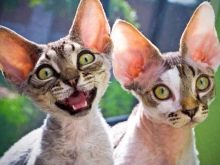
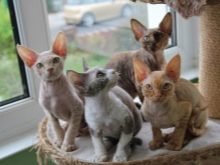

Description
With all their physique, the Devon Rex resemble noble leopards. In fact, this breed is the result of the selection of numerous varieties of cats.
Today there is a certain standard for the external characteristics of this breed of cats. You can familiarize yourself with it below.
- The average weight of a healthy animal is usually between 3.2 and 4.5 kilograms. Males often weigh slightly more than cats.
- The average height at the withers is up to 35 cm. However, some people prefer to measure this breed precisely in length, taking into account the size of the limbs.
- Colors in color. There are completely different shades, however, purebred Devons are exactly monochromatic individuals: black, white, whitish, brown. The most common variegated colors are tortoiseshell, Siamese and golden red.
- Average life expectancy. Under ideal conditions, an ordinary Devon Rex can live 14-16 years.
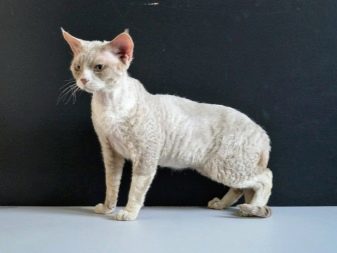
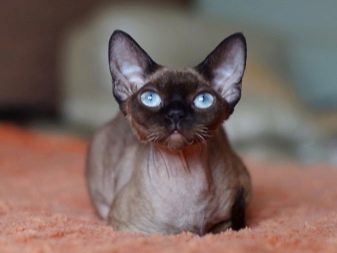
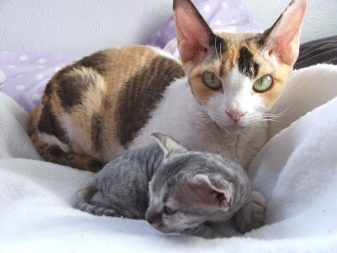
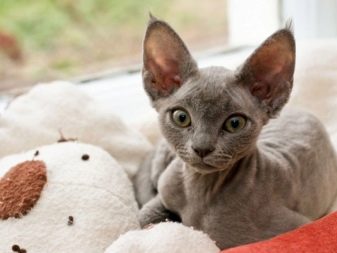
Here is a detailed description of the external characteristics and exterior of the breed.
- The head is of a wedge-shaped triangular type with outlined cheekbones and a clear "pinch". If we look at the head in profile, then the stop will be clearly visible (or a sharp transition from the forehead to the back of the nose or muzzle). The skull itself is flat, but the transition from nose to forehead is smooth and rounded.
- Muzzle. Short, however, it stands out strongly from the rest of the profile. The mustache pads are noticeable, the chin is large, slightly rounded.
- Eyeballs. The eyes are unusually large, set wide and round in shape. The iris is often bluish, golden, green, or ashy, with dark and white colors. It is believed that there is a relationship between eye color and color in Devon Rex, however, the iris should in any case be clear and not hazy.
- Ears. Thin, covered with a small layer of wool, set low, the base almost bordered by the line of the superciliary spirit. The tips of the ears are rounded, the auricles with the inside look forward. Brush tips are usually absent, but can be found in mixed breeds.
- The torso. Strong, powerful, but not particularly thick or short. The chest is wide, the limbs are long, resilient and powerful. The front legs are usually slightly shorter than the hind legs, which allows the animal to make large jumps in length and height.
- Mustache and eyebrows. Practically undeveloped and invisible, short.
- Extremities. Despite the great length, the legs of this breed are thin, and the pads are extremely small, usually round in shape. The tail is long, covered with a uniform but thin layer of hairline. Sharpened at the end.
- Neck. Oblong but thin. In adult cats, it is characterized by small leathery folds along the larynx.
- Hair. Contrary to popular belief, Devons have very dense curly hair on all parts of their body. An exception may be the ears, chest and neck, where the hairline is usually slightly less. If an individual has bald body parts or bald patches, most likely she has health problems. It is also necessary to be able to distinguish the difference between thin hair and color; in breeds with a dark color, the coat always seems to be thicker.
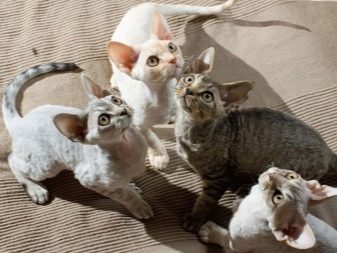
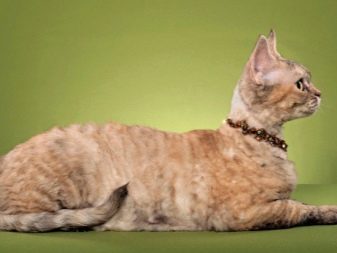
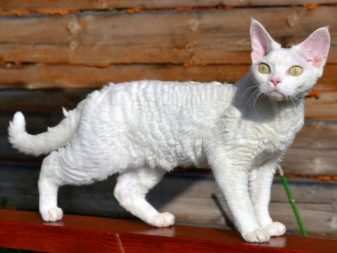
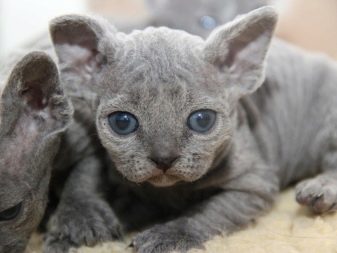
It is worth pointing out the main positive and negative points that experienced Devonian breeders note.
Let's start with the pros.
- Bright and extraordinary appearance that will be remembered by each of your guests.
- Despite the thin hair, they have good and strong health, rarely get sick.
- Ideal for lovers of active cats who are with you all the time, and do not sit out somewhere in the corner or sleep all day long.
- Extraordinary intelligence, excellent mental ability and a propensity to learn and train.
- Great for children, the breed is not prone to jealousy. Gets along well with other pets.
- Love for cleanliness, which is why he often likes to lick himself.
- The breed is considered by some to be hypoallergenic, however, this is not so. Due to the short hairline, it leaves behind very little wool and rarely sheds, which reduces the risk of allergic reactions in the owners. It is thanks to the short coat that it does not require much maintenance.
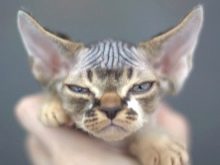
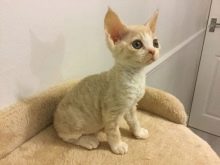
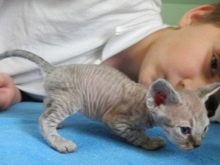
Some disadvantages are also noted.
- Parting with the owner is extremely difficult. An ordinary Devonian can fall into a real depression with a prolonged absence of the owner of the house. That is why people with a tight schedule and little free time are not advised to start the breed.
- Excessive activity that leads to damage to home furniture and other unstable items. At an early age, he likes to gnaw all the wires and fabric that come his way, and the Devon, who is not trained in manners, will shit where he pleases.
- Without constant stress and entertainment, he feels depressed. Needs a lot of games, tunnels, balls and lounging racks. A love of jumping, as well as extreme curiosity can lead to injury in a pet. Try to wean him off jumping on cabinets and high dressers.
- The breed is considered rare in Russia and the CIS, and therefore is expensive, and healthy individuals can be difficult to find.
Despite all their advantages and disadvantages, Devons are still considered exclusive cats, which rare breeders decide to acquire.
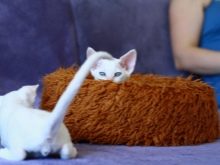

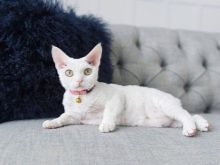
Character traits
The rarity, grace and natural beauty of the breed did not develop any aggressive or arrogant character in the Devons. Quite the opposite, such cats do not tolerate loneliness and try with all their might to attract the attention of the owner. The loyalty and affection of this species to humans is sometimes compared to that of dogs.
This cat will always be with you. As soon as you get home, he will meet you and rub at your feet contentedly. When you go to the kitchen, he will follow you with a tail, but waiting not for food, but for approval and affection. When you are resting, he will sit on your hands, kneel, or even try to climb onto your shoulders. This is an incredibly companionable cat breed.
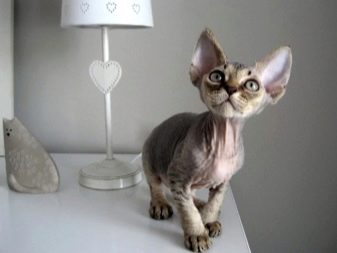
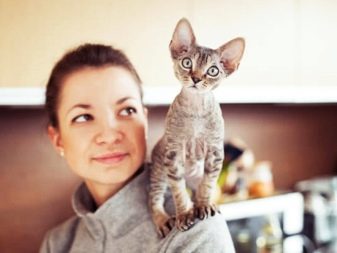
Let us consider in more detail the qualities of the representatives of this breed.
- Activity. From birth to old age, Devons are incredible fidgets. They poke their noses everywhere, they care about everything. They never get tired, rarely rest, and generally behave like real children.
- Socialization. Love for human companionship, patience with children and loyalty to other pets puts this breed far above other cats. In addition, the Devon does not belong to those cats who, when they see new people in the apartment, will simply run away and hide under the sofa. They will try with all their might to get to know each other and attract attention to themselves.
- Empathy. Despite their activity, Devons have a wonderful feeling of the owner's state and are inclined to empathize. At the same time, if the owner is angry or very tired, they will understand this and will not get bored.
- Learnability. In favorable conditions of complete trust of the cat and the owner, Devons demonstrate remarkable results in training, they can learn up to a dozen tricks in a lifetime.
- Dangerous Adventures. The increased activity of Devons makes them quickly tired, so cats very often need food. The need for additional nutrition leads to the theft of food straight from the owner's plate or to the search for edible food throughout the apartment. This can lead to damage to property or to poisoning (if the cat eats some overlapping crust of bread or part of an old fruit).
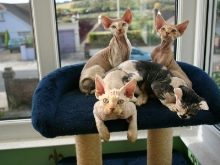
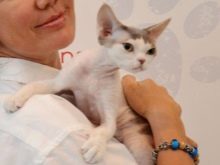
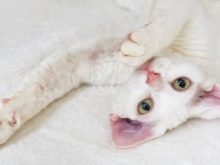
Life span
As already mentioned, most Devon Rexes live on average up to 14-16 years, however, there are cases when individuals survived up to 20. Life expectancy also strongly depends on heredity, as well as on the conditions of detention themselves.
The main factors affecting the lifespan of the Devon Rex are several.
- The quality of care and care for the pet, conditions of detention.
- Regularity, variety and quality of food.
- The general psychological state of the animal. Frightened, aggressive, and dissatisfied individuals live much shorter lives.
- Heredity - when buying a Devon, you should check his documents, as well as the documents of his parents to identify rare hereditary diseases.
- Socialization. Communication is an important factor in life for Devons, with a prolonged absence of owners, it is prone to depressive disorders and imminent death.
- Climate and territory of detention.
It is recommended to plant in regions with moderate humidity and an average temperature of at least +22 degrees Celsius in summer.
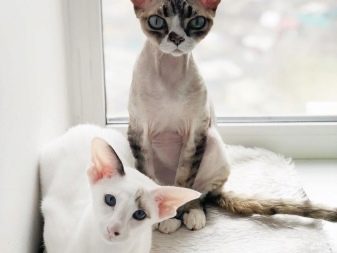
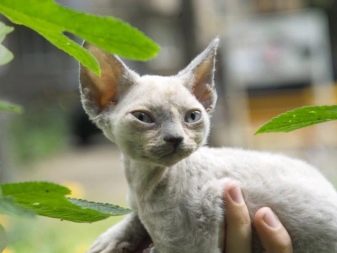
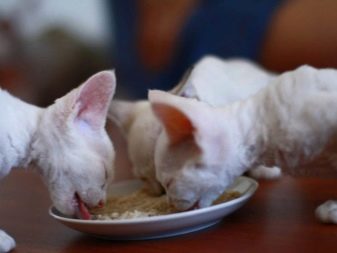
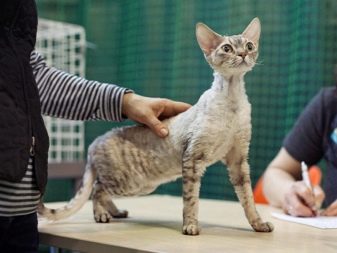
Color options
This breed does not have any specific standard for coat color. In the course of selection, breeders use a huge amount of genetic material from different breeds to identify unique colors and shades. The main condition in crossing is the preservation of the texture of the coat in the form of short and dense curls. There are both white, black, brown individuals with a solid color, and cats with a bicolor and variegated coat color. The most common color options are listed below.
- Siamese colors. Offers white or gray hair on the chest, back and abdomen, along the limbs and on the head. However, it differs in characteristic brown spots on the face and nose, as well as dark legs and ears. The tail is usually the same color as the muzzle.
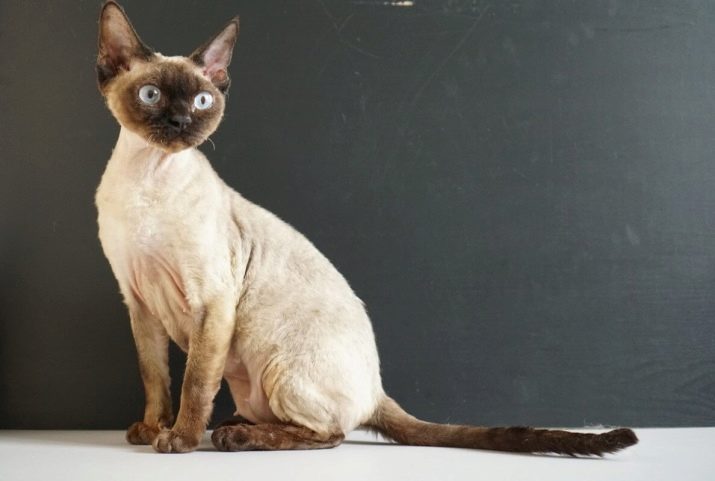
- Cinnamon. Honey or pale brown shade with indistinct dark tiger stripes all over the body and limbs. The chest and ears are several shades lighter, the nose and muzzle, on the contrary, are darker.
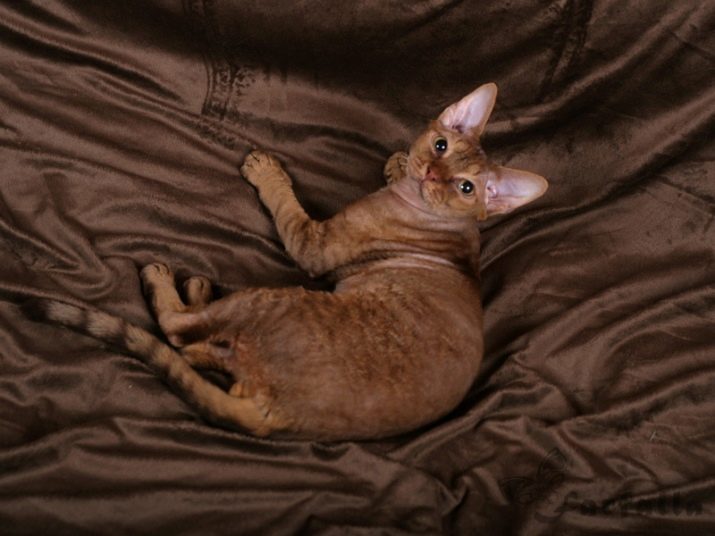
- Point. Gray or pale color all along the body. A fuzzy wide dark line begins from the ridge, which goes all the way to the tail. The tail is covered with black and white stripes on the outside, and mostly dark on the inside. The same goes for the inside and outside of the limbs and legs. The muzzle shows characteristic darkening along the nose and eye line.
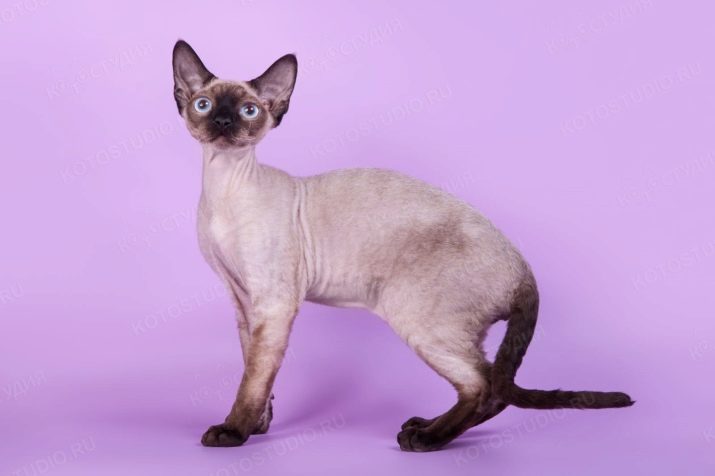
- Bicolor. It is characterized by two dominant colors with a sharp contrast - most often these are white and black spots along the entire body. The back is usually dark, the chest is lighter with sparse spots. The muzzle and outer side of the limbs are also most often light.
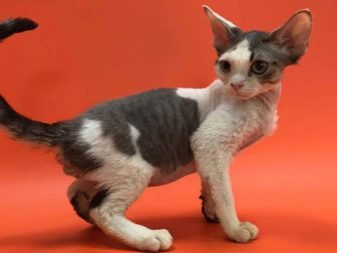
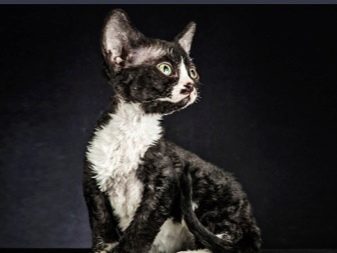
- Tabby. It resembles the color of cinnamon, however, in the light, the hair shines with a specific red or light chocolate shade. The tail is covered with black-brown stripes, the inner side of the limbs is dark, the legs themselves are light. Distinctive thin black vertical stripes can be seen above the eyes in the browbone region.
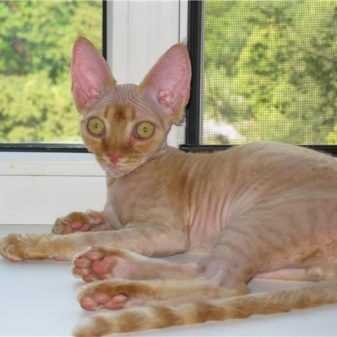
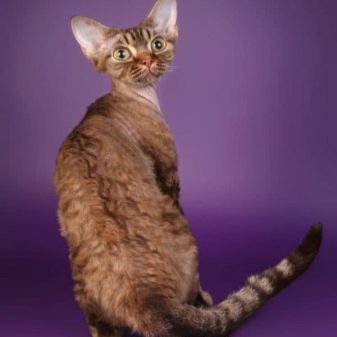
- Tortoiseshell color. A variegated and discontinuous color, which includes four separate tones at once: black, brown, white and yellowish. Typically, the shades appear as random patches all over the body, including the tail, limbs, and chest.
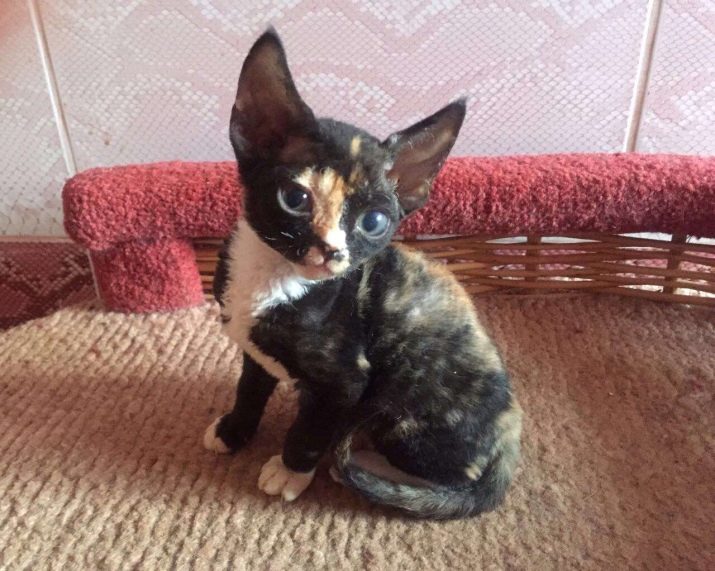
- Black. Color with a strict dominance of dark and black shades. Dark coat covers the entire body of the pet, there are no light zones.
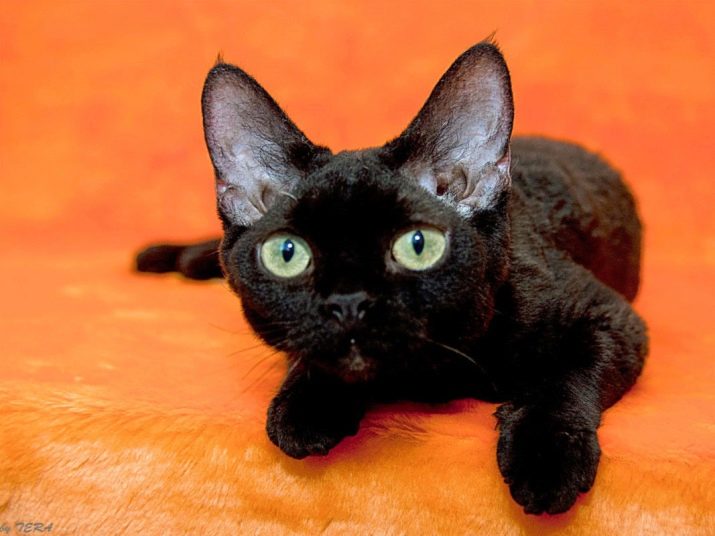
Conditions of detention
Most owners are afraid to have Devon Rex because of the harsh conditions. This myth developed due to the external similarity of the animal with the sphinx, which, indeed, requires special care. Devons are much less picky about food and place of residence, the main thing is to love a pet - this will be the best remedy for all adversity for him.
Let's deal with some recommendations and conditions for caring for this breed. Most of the advice will be about general cat grooming, so it won't be difficult or overwhelming for most owners.
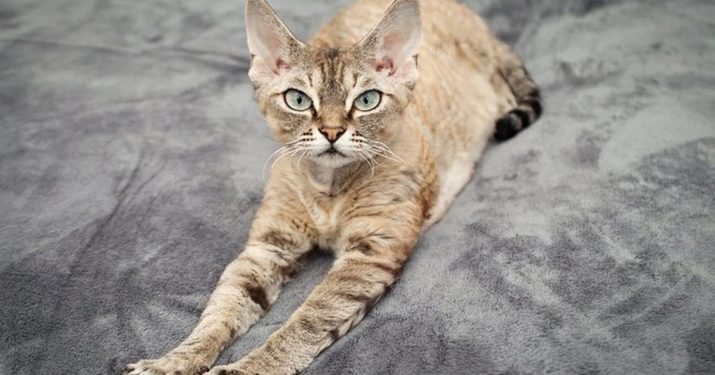
Regular care should include a few essential steps.
- The washing up. Most domestic cats do not need frequent bathing - water harms the skin, can get into the ears and cause suppuration and irritation, and they also prefer to wash on their own. This rule also applies to Devon Rex - a thin layer of wool does not get dirty so quickly and almost does not lose its appearance. Ideally, these cats should be washed no more than a couple of times a year. The optimum water temperature should be around +38 degrees, do not allow moisture to get into the ears, eyes and nose.
After bathing, you do not need to wipe the cat, the hairline is rather short to dry quickly on its own.
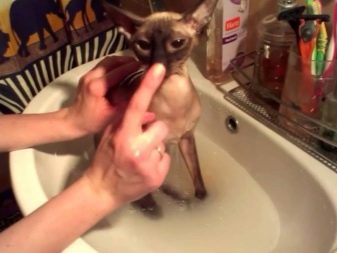
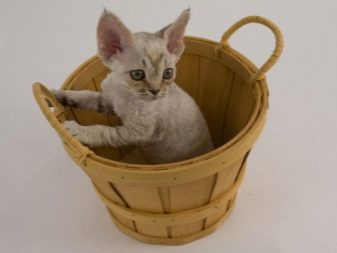
- Ear Care. Due to their large size and vertical position, a large amount of dirt regularly accumulates in the ears of the Devons. Experienced breeders prefer brushing every day to reduce the risk of inflammation. In this case, cotton wool or special tampons are used to clean the ears. A pet is unlikely to like this procedure, especially if you are doing it clumsily, so it is advisable to keep him busy with some kind of game, a treat, or just stroking and telling something while cleaning.
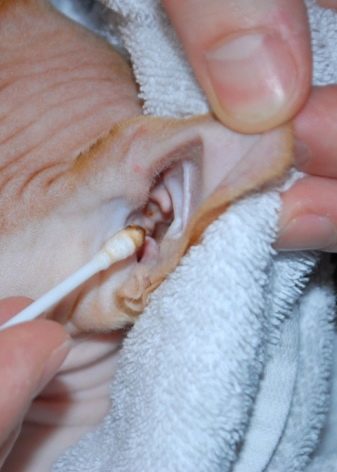
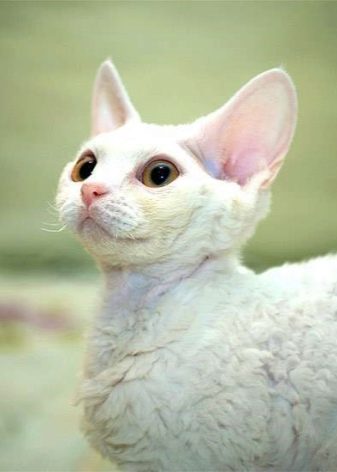
- Eye prophylaxis. Devonian eyes are very large and delicate, since the Devonian himself loves an active lifestyle, they almost always remain open. That is why some of the diseases of these cats are associated with the eyes.
The eyes should be rinsed from time to time using special drops. Try to immediately get rid of dried mucus from the corners of the animal's eyes - it can cause irritation and redness.
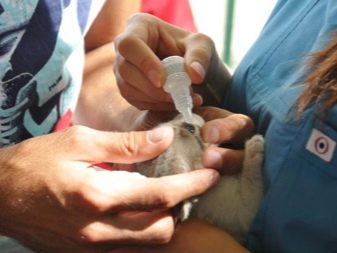
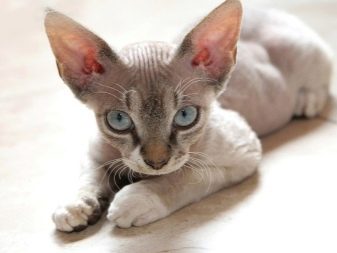
- Claws. Starting from adolescence, little Devons actively grow claws. As a rule, they grind off from games and entertainment, and the pet itself often loves to gnaw them on its own. However, adults or older individuals may not care about claws, which even cause them discomfort. In this case, it is worth using special tweezers.
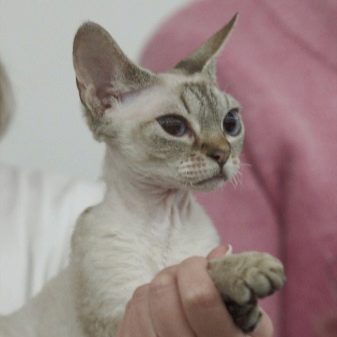
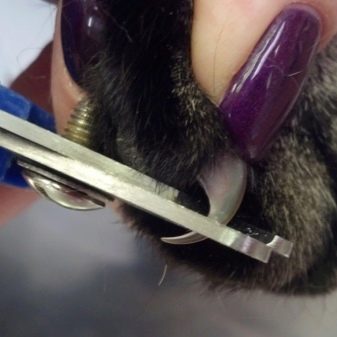
- Teeth and oral cavity. Not all owners resort to brushing their teeth, but this does not make it less useful. Just like in humans, in Devons, caries and the accumulation of food debris in their teeth are possible. In this case, there is a chance of sharp bones or other elements falling into the gaps between the teeth of the animal. For regular cleaning, you will need a special paste and a toothbrush, if you do not have time for this - it is worth examining the cat's oral cavity at least once every couple of weeks for suppuration or bad teeth.
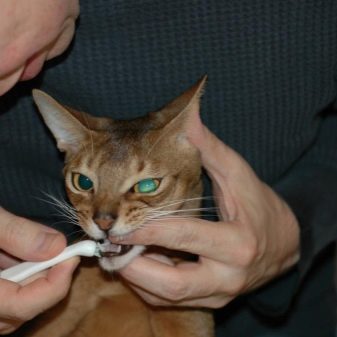
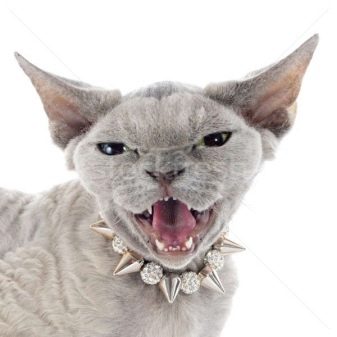
- Hair care. Most of all the worries of any cat lover consists in caring for the animal's hair: combing, examining for the presence of fleas, cleaning excess and faded hair. The Devons have very little wool, and the shed excess is unlikely to cause much trouble.
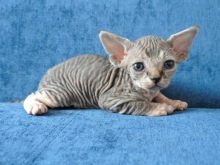
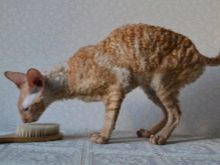
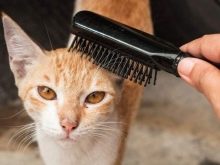
- Vaccinations. Do not forget about regular vaccination sessions - this will save your pet from many dangerous diseases.
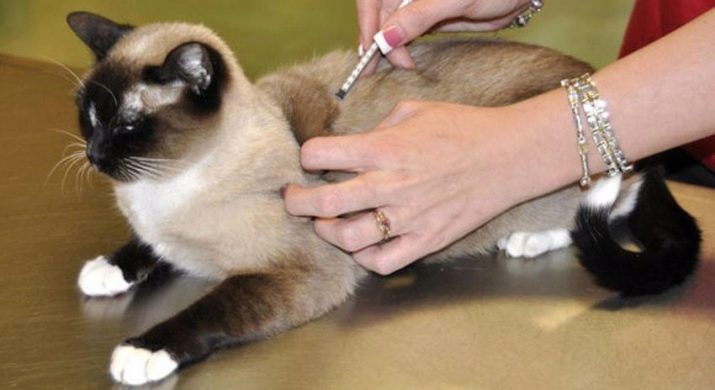
It is also worth understanding the conditions in which a competent breeder will properly equip his apartment for such an exotic and active pet as the Devon Rex. Understand that new space for these cats is always an adventure. Do not try to disaccustom an adult pet to go to some place or not to jump somewhere - this species will follow its goal to the end, until it gets a bump on it.
But also remember that your hopes of protecting a certain place in the apartment from this cat, be it a pantry or a balcony, will end in complete failure.
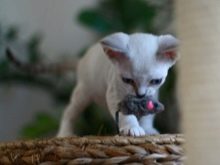
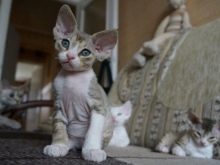
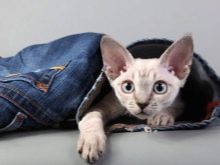
The following guidelines will help you not only protect your pet from all potential household threats, but also from itself.
- Remove from open places as much as possible all small things, as well as equipment that can be easily damaged. These things include: TV cables, phone chargers, ordinary laces, threads and needles, remote control. All these things can potentially harm your animal, which, when learning something new, completely disables the instinct of self-preservation.
- There should be no liquids or household chemicals (laundry detergents, bleaches and conditioners) in an open place. This also applies to first-aid kits, various mixtures of pests, ointments and creams. All these Devon Rex can easily be poisoned, as, indeed, any cat.
- It will be in your best interest to remove from shelves, dressers and cabinets all decorative elements that can easily fall, break or break. These are, for example, vases, shelves, frames, books, lawns. The adventures of the Devon Rex are nothing without climbing and active hide and seek, especially on the hills, because of which all these things can be seriously damaged.
- Either completely remove or replace ordinary curtains with blinds - Devons just love to climb on them, which is why even the most durable curtains and tulle can turn into real rags.
- These cats' unique parkour abilities and curiosity make Devon Rex potential victims of open vents and balconies. Despite the fact that a cat can tolerate a fall from the 2nd or 3rd floor painlessly, it will be better to protect yourself and not leave the windows open.



The number of personal items for the Devon Rex should include several items that must be purchased before buying the pet itself.
- Shelving, house or any other place convenient for the cat. There should be no other pets or any of the owners. The Devonian should have its own personal space, into which no one but him could get. A house or a couch should be located in a well-lit place, where one of the owners would always be (this is a very important point). These cats love warmth - after all, their fur coat is not so thick to withstand frost, so choose a place near the heating elements and make sure that there are no drafts there.
- When the Devons are hungry, they can easily turn over all your prepared food and water bowls. Therefore, avoid buying lightweight polymer models - it is better to turn to metal or ceramic options.
- All of your pet's toilet business should take place from the very first day in only one specific place. If this is a room, try to keep the doors open at all times so that the pet has 24/7 access there. You can choose any filler, but avoid products with a pungent and specific smell (such a smell will drown out excrement, but also scare away the cat itself).
- A device for grooming hair and clipping nails, cotton swabs for the ears, massage brushes.
- You should take care of carrying it - especially if you are going on a hike in the winter. The carrier should be quite large so that the animal feels comfortable there, it should have direct access to air, as well as insulated walls.
- Buy a scratching post or object where the animal can knead its paws and grind its grown claws.This thing can be found in any pet store, often the design of the scratching post includes balls for games, a lounger, or even the house itself.
- Not a day without entertainment - immediately stock up on a large number of different toys with which your pet will play during its leisure hours. Toys should be given consistently - a large amount of entertainment disorientates the pet, and they themselves can soon get bored with prolonged contact. Tunnels, various passages or special shelves will also be a good addition, because Devons are born climbers.
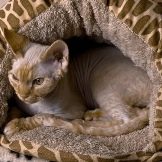
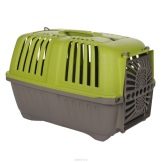
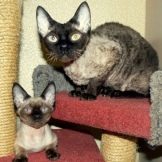
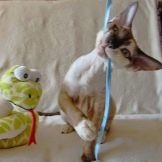
What to feed?
The process of feeding these cats cannot be called difficult; with the proper patience, even an amateur breeder can handle it. There are 3 types of feeding for these pets: natural food, prepared food and formula, combination option. The features, pros and cons of each type will be discussed below.

Ready feed or mixture
In this case, you need to regularly buy certain food in the store, it must be specialized food for cats of a fairly high quality - the Devon can be dismissive of low-grade food. Food can be either dry or in the form of canned food or a mixture, the choice will depend on the price and usefulness of the individual food.
The advantages of this food are obvious.
- These feeds are pre-balanced and do not need to be supplemented with any other vitamins. Quality feed contains all the necessary elements for a young Devonian.
- Typically, dry food can be stored for months in the correct packaging and dry place. As for mixtures and canned food, they are sold in vacuum packaging and may also not deteriorate for a long time in the refrigerator or freezer.
- You don't need to rack your brains over such food. You just pour in the next portion of food for your animal and you know that it will be good for him.
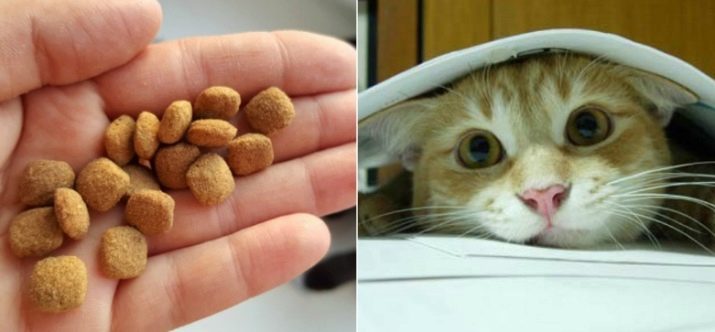
There are also disadvantages to dry food and canned food.
- Even wholesale regular purchase of quality feed will greatly affect your wallet.
- Devon Rexes need variety not only in terms of entertainment, but also food. One meal a day can become boring to them over time, leading to health problems.
- Food manufacturers generally recommend a specific amount of food per meal. The problem with such food is that it may not be enough for a particular individual - for kittens, pregnant females or elderly cats. At the same time, even mild overeating can lead to obesity and gastrointestinal problems.

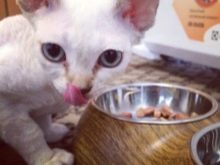
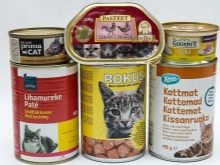
Natural products
The method involves the inclusion in the diet of only natural food or food prepared by the pet owner personally. This includes meat with a low percentage of fat, offal (necessarily boiled), salads from boiled vegetables, cereals (buckwheat, rice). Occasionally, you can add fermented milk products (cheese, cottage cheese, kefir), eggs and fish (preferably seafood) to the diet.
Natural food has several advantages.
- If you are a skilled chef and know how to handle even a small amount of food competently, then this method will be cheaper for you. You yourself monitor the quality of the products provided, their freshness and cooking conditions.
- In such a diet, it is very easy to diversify the diet on your own. You can add some vegetables or fruits to the serving if you are sure that your pet needs certain vitamins.
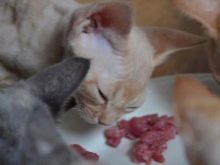
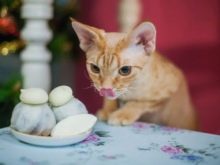
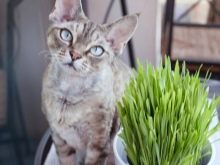
As a rule, cats treat natural food with more respect and less suspicion. As the saying goes, fresh meat is meat, to the detriment of dry food, which must be tasted to make sure it tastes good.
But there are also disadvantages to such feeding.
- Difficulty balancing vitamins and calories. The more foods there are in a serving, the more carefully it is worth calculating the ratio of proteins, fats and carbohydrates.
- Cooking natural food will surely take you a lot of time.And if at first after buying a pet you can easily hold out on enthusiasm alone, in the future, preparing such food will become something of an unpleasant duty.
- Natural food is much less stored. This food should be given immediately after preparation so that all nutrients do not evaporate.

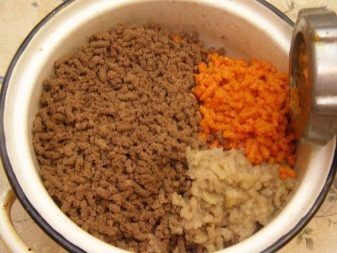
Even if you perfectly match the entire composition in accordance with the correct nutrition of the cat, it will lack what is usually found in ready-made foods - vitamins and minerals.
Mixed feed
The secret here is to alternate prepared food and canned food with natural food, but avoid feeding different foods in the same portion. The ideal option would be to serve ready-made food in the morning to gain energy for the next day, and postpone the supply of natural food until the evening so that all natural elements are assimilated during the period of rest and sleep.
The advantages of this scheme:
- less waste of time and money;
- it is easier to choose a balanced diet;
- constant variety of food, because of which it cannot bother the pet.

Considering all of the above, you should follow the general rules for feeding cats.
- Use only fresh and quality products.
- Do not feed your pet food from your table, especially pickled, salted, or fried foods. The body of cats is not adapted to processing food in this form.
- There should always be clean water in the open access of the pet. This applies primarily to those cats whose diet consists largely of dry food.
- For feeding, you should choose a strictly defined time so that the cat's body gets used to the feeding schedule.
- Wash dishes and bowls regularly, otherwise old food will spoil, which threatens your pet with poisoning.
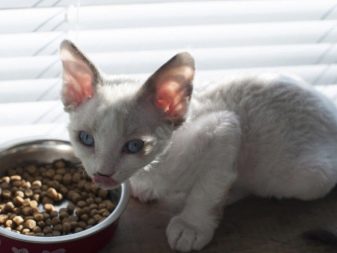
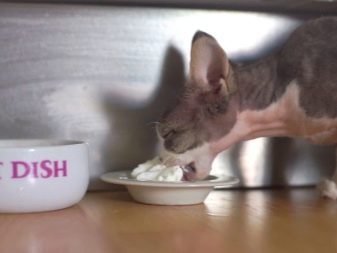
Breeding
Unfortunately, breeding this breed at home is not an easy task. Initially, the Devons were created due to mutation, and the first individuals interbred exclusively with their relatives, which had a bad effect on the preservation of the gene pool.
New individuals possessed fragile immunity and often died at a young age from neurological pathologies and diseases of the muscular system. After the selection of completely healthy individuals, a painstaking selection process began, which continues to this day.
By the standards of other breeds, the Devon Rex is an extremely young emerging species. Many of the positive qualities inherent in this breed were borrowed from the genome of other breeds. Thus, maintaining the overall appearance of the animal and adding more advanced qualities, the variety that we know today was created.
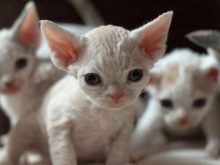
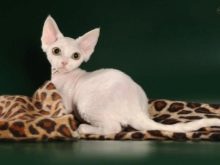
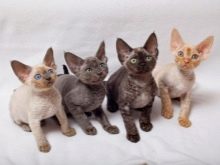
For breeding Devons today material of British and American short-haired breeds is involved. The main problem in breeding this species is considered to be the incompatibility of blood groups in the mother and kittens. There are 3 well-known blood groups in domestic cats: A, B, AB. The blood group depends primarily on the area of distribution and the origin of the breed itself. Most often, animals with blood type B are found - in Devon Rex it is about 50% of all individuals, respectively, about 40-50% of individuals of group A. Blood type AB is extremely rare, therefore, few people take it into account when breeding.
The fact is that blood type A is dominant, and when parents with A and B types are mated, babies of type A are always born (if both parents are of type B, then kittens will only have type B blood). The type of blood as such does not affect the health of the young, however, there is a frequent problem of incompatibility of the mother with type B blood with type A babies. The problem is that the cat's body produces special antibodies that are designed to inhibit the cells of type A babies. At the time of the birth of the fetus, until the very birth, these antibodies do not enter the placenta, which means that healthy babies are born.
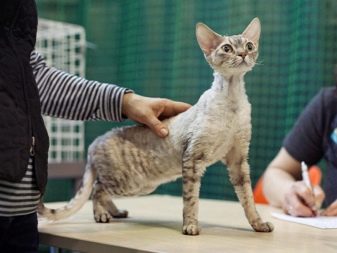
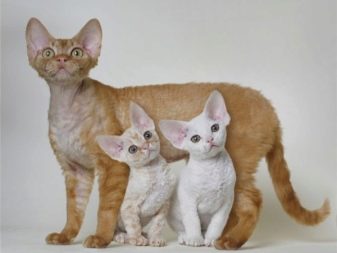
In the first few days after giving birth, the cat, together with milk, secretes the so-called colostrum, or primary milk. If you allow the cubs to the mother these days for feeding, then there is a great chance that their body simply cannot cope with so many dangerous cat antibodies. There are cases when kittens are born that are resistant to these antibodies, but these cases are rather an exception to the rule - the young develop a special immunity to antibodies. One litter of Devon Rex can contain up to 5 kittens, which means that approximately one kitten of them will be resistant to these antibodies. Breeders find that litter mortality increases with mating rates from the same incompatible parents.
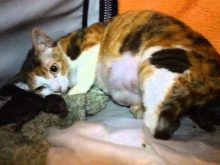
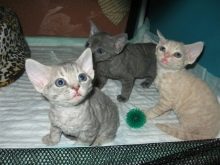
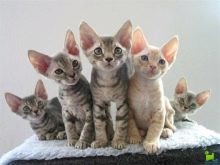
To avoid such mortality among the litter, some breeders recommend that the newborn kittens be immediately taken away from the mother. However, this has its drawbacks.
- Mother's milk contains all the elements necessary for growth and development; a person, even with all his might, will not be able to fully balance nutrition, like such a feed.
- Your cat will be extremely depressed if you take the kittens away from her. This can lead to serious disorders and illness.
Not every breeder is able to take proper care of newborn kittens. These should be ideal conditions of maintenance and care, which are especially important in the first months of life.
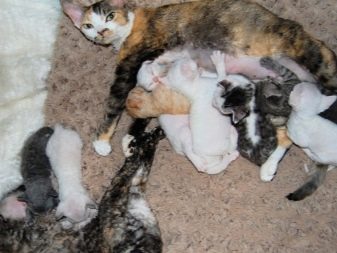
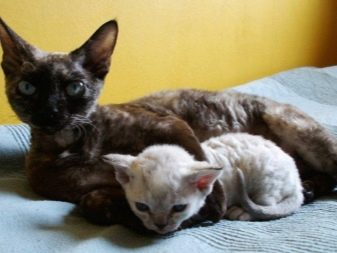
Upbringing
Devon Rexes fully grow stronger by three months, during which time they form a spine, strengthen muscle tissue, improve the work of the digestive and cardiovascular systems.
Since you are unlikely to be able to sell Devon Rex kittens under three months of age, you should take care of their upbringing. Many breeders are interested in the question of the character of the animal, its socialization and activity, because somewhere they will become real family members.
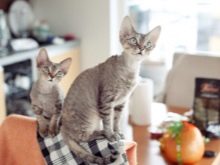
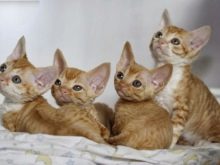
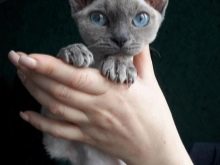
The established rules in your apartment should be outlined from the very first days, they may include a number of installations.
- Areas closed to the public in an apartment must be marked immediately. If this is some kind of room, close the doors there, not allowing the animal to enter there. If this is a work or kitchen table with a lot of food and delicate utensils, remove the animal as soon as the Devon climbs onto it. Weaning you off the kitchen table and stealing food won't be easy. Try to feed the animal more often before you go to breakfast or dinner.
- It is easiest to train young animals to the toilet if the cat already has its own latrine in the house. Young kittens are looking for such a place by the smell of their mother, so it is worth putting some of the litter from the cat's tray into the kitten's own tray. The kitten will not be able to get used to this place right away, in the first weeks, and sometimes even months, you will have to guide the pet yourself.
- Almost from birth, kittens begin to actively grow claws, which can interfere with movement or climbing. To get rid of discomfort, cats tear furniture and interior items. Immediately take your pet to the scratching post, and to make sure that this toy is as easy to sharpen as your fabric sofa - just run it with a paw along the surface of the accessory.
- A very important point in the upbringing of young kittens is hygiene training. First of all, this concerns cleaning the ears, eyes, clipping nails, and washing. Before the procedure, the animal should be calm, it is best to do this in the evening, then the activity of cats decreases significantly. Hygiene items should not be stored in any specific place, they should always remain in sight so that the pet is not afraid of them. During the procedure itself, talk to the cat more, praise him and calm him down. You can give him some small treat from time to time to distract the pet. A calm environment without stress and aggression will lead to the fact that the kitten will get used to and will perceive such procedures as something due, but safe.
- Few owners like to take cats outside, where the animals can feel a lot of stress (especially if you have never taken them outside before). If you want your pet to have a chance to unwind and frolic on fresh grass, you should train him to leash and collar. Without them, the cat should not be released into the street; out of curiosity or fright, the Devon can rush in any direction and simply get lost. This is especially dangerous in the winter season, when even a couple of hours of frosty air can have a catastrophic effect on the Devonian's body. And in general, it is better not to walk this breed without a blanket in winter.
- In education, avoid using harsh words, censures and other expressions with vivid expression. These animals respond to negativity only with negativity and will grow up to be aggressive, angry and vengeful animals. The same goes for physical abuse. Try to approach parenting through a method of encouragement. For every trick done - a delicacy, brought slippers - delicious, responded to his nickname - even a simple affectionate word will show the cat that you are happy with it.
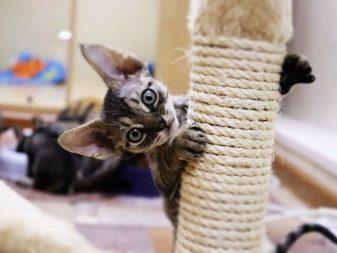
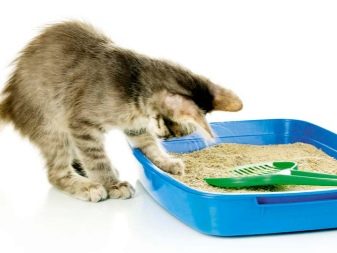
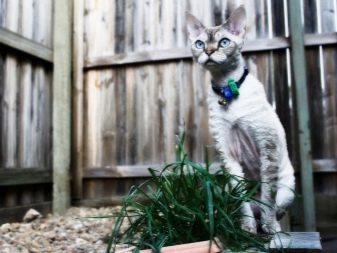
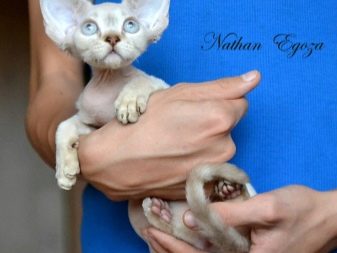
Health
Despite the relative underdevelopment of the breed itself, the Devons have simply excellent health and rarely get sick with something. The most common diseases in Devons are related to common feline diseases. But there are also some hereditary diseases that can seriously affect the life of a pet. You will familiarize yourself with them below.
- Congenital hypotrichosis. In other words - ordinary baldness, which this breed got from the sphinxes. Baldness most often speaks of a non-purebred individual, but if it is local, then, most likely, it concerns health problems and a lack of vitamins.
- Hypertrophic cardiomyopathy. Pathological changes in the cardiovascular system. Detection of the disease at an early stage allows you to determine the necessary treatment, in which the animal can live a long life.
- Myopathy. It is both hereditary and acquired disease due to improper metabolism in the body. With it, a certain part of the muscles in the body ceases to function, and over time, it completely refuses to work. It can affect both one part of the body or a limb, and the whole body. It is rare, but in the last stages it cannot be cured, which is why many Devons die from this disease.
- Dysplasia of the hip joint. In other words, a disease of bones and cartilage tissue. It is very difficult to define, the primary symptoms are easily confused with the fatigue of the animal. As a rule, it is determined already after reaching the age of six months by experienced veterinarians. In the early stages, it is possible to cure.
- Coagulopathy is a disease in which blood clotting processes are disrupted. Appears from improper nutrition and lack of vitamins in the feed.
- Obesity and pathology of the gastrointestinal tract. Occurs due to irregular and unhealthy eating habits. Weight gain puts more stress on the heart and other organs. In addition, skin diseases are possible.
- Malassezia dermatitis is almost the same as baldness, but is characterized by hair loss on the background of rashes and itching. It is treated in the same way - by modifying the diet for proper and balanced nutrition.
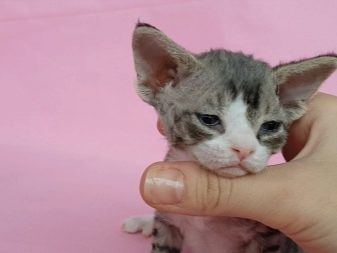
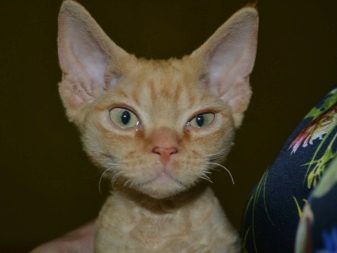
Do not forget to regularly vaccinate your pet and do preventive procedures to cleanse the body of parasites. The first vaccination should be carried out as early as 3-4 months of age, then revaccination should be carried out - already upon reaching the year.
Popular names
Due to their extraordinary appearance, the Devon Rex deserve the same extravagant and unusual name. Here, the imagination of the owners is absolutely not limited by anything, however, there are still certain recommendations when choosing nicknames for cats.
- The nickname should be moderately short.Cats do not remember complex and long phrases, even in training they react to strictly defined short commands: up, to me, stand, somersault. If your cat has some kind of convoluted or difficult to pronounce name in the documents, just shorten it to a version that you yourself can easily pronounce and remember.
- The name should be sonorous and loud. Despite the fact that the Devons respond favorably to hissing and whistling sounds, the best option would be to choose a nickname with hard and loud consonants: k, h, c, d, g.
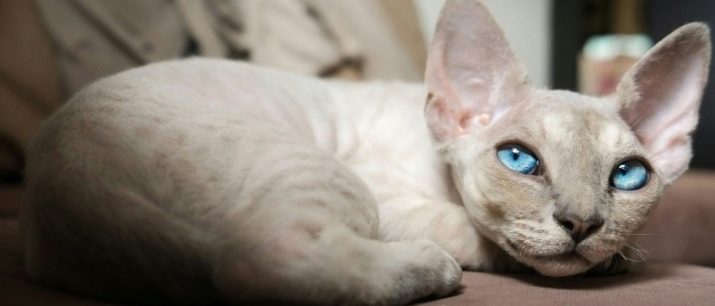
It is worth accustoming to a nickname from childhood, when you started raising a baby. The sooner the pet gets used to its name, the easier it will be for it to establish contact with the owner.
In their small homeland, the names and nicknames of the Devon Rex are associated with several aspects: the territory of birth, associations with a famous historical or literary personality, associations with sheep due to the non-standard texture of wool. Below you can find a list of the most common Devonian names in the UK.
- Nicknames associated with the territory. In Devonshire itself, many old and even ancient estates and castles with bizarre and non-standard names have been preserved. To distinguish their pet from others, English breeders prefer to call pets by the following names: Podham, Totnes, Compton and Holdon and Pomera. All these are the names of famous castles and territories, known to everyone within the boundaries of modern England.
- Few people know the attraction of the famous writer Arthur Conan Doyle to this English county. It was in these swamps that the mysterious Hound of the Baskervilles lived. That is why you can associate your pet's nickname with this wonderful detective story. The names Barimore, Laura and Baryl would be appropriate here.
- From famous historical figures on the land of Devonshire, Francis Drake was born - a world famous seafarer, who, according to the records, had fiery red hair (which is why the name Drake is ideal for an animal with a red or crimson color). If your Devon is very fond of purring quirky melodies, then you can call him after Chris Martin - the lead singer of the famous rock band Coldplay, who was also born in these lands.
- Associations with English transliteration of names. For example, for noisy, active and curious pets, the nicknames Noisy (curious), Bizar (extraordinary, unusual), Light (light, light, graceful) and Brave (brave, brave, fast) are suitable.
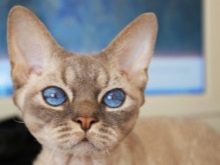
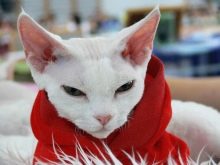
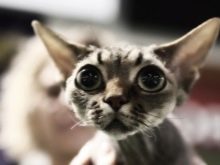
If you didn't like any of these names (which is not surprising, because they are not typical for a Russian breeder), you can come up with one yourself. When choosing a nickname, several factors are taken into account.
- Purebred breed. If your Devon Rex has wonderful documents and certified parents with good indicators at exhibitions, it may be worth calling him a noble and sonorous name: Count, Lord, Lady, Lady, Duke, Prince (and derivatives from these names).
- The color of the breed also plays a significant role in choosing a name for a pet. For dark pets, nicknames are suitable: Black, Dusk, Night, Bagheera. For the light ones, the following may be suitable: Diamond, Snowball, Albus, Tuchka, Gray, Dew. If you have a pet with a multi-colored coat, then think of universal or colorful names like Fire or Dawn, Rainbow, Tortilla.
- Character. Already at a young age, Devons begin to be active in moral terms, it is thanks to such features as restlessness, calmness or playfulness that names are often given. For active pets, pick up fast and clear names: Lightning, Whirlwind, Brawler, Fidget, Tramp.
- Ears. Often the basis in coming up with names for this breed was fantastic and fantasy stories and compositions with elves, wizards and monsters (due to the unusually large ears of this breed). Successful names in this case might be: Legolas, Haldir, Elrond, Penlod, Galion (boys).For girls, names are suitable: Arwen, Anaire, Aredel.
- Any other associations with animals, plants, natural phenomena, famous people: Caesar, Chamomile, Bars, Grad. Here, the choice already depends on the owner himself and his hobbies, as well as on certain events that contributed to the birth or upbringing of the pet.
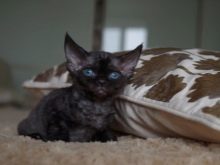
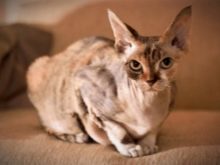
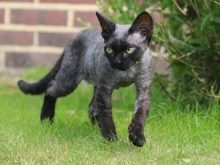
This is just a list of the most common names in Russia and the CIS.
Owner reviews
Most experienced owners of the positive traits of this breed indicate extreme activity, curiosity, desire for communication and friendliness towards the owner and his family. And also many people note excellent health and resistance to many colds and viral diseases.
Of the negative and negative traits, breeders do not like stubbornness and importunity, the excessive obsession of some individuals, as well as the habit of Devons to constantly poke their nose everywhere.
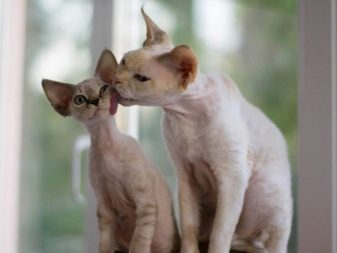
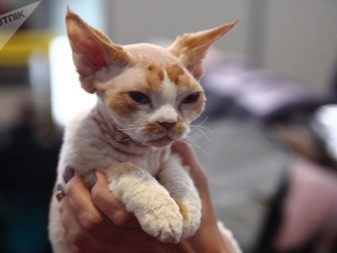
Be that as it may, but most families prefer to bypass this breed. Most common reasons:
- such cats are expensive;
- their extraordinary appearance does not seem to everyone to be successful and pleasant;
- the breed is extremely difficult to breed and demanding on the experience of the owner.
About the Devon Rex cat: description, care and maintenance of the breed, see the next video.
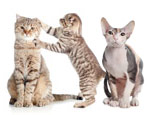
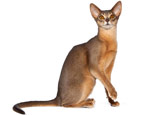
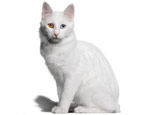
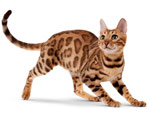
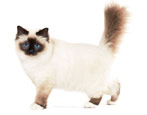
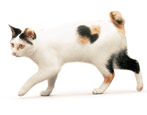
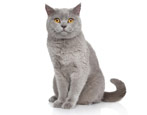
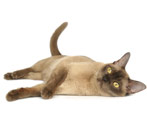
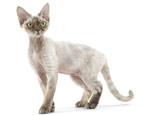
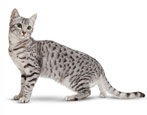
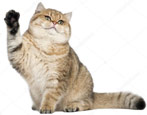
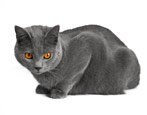
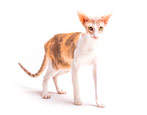
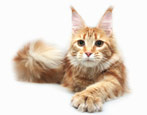
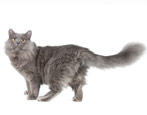
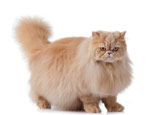
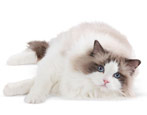
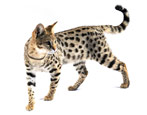
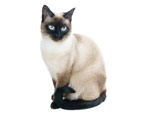
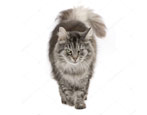
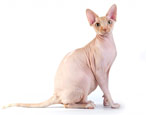
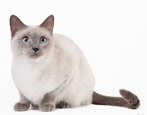
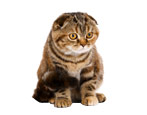
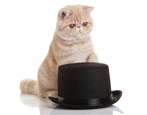









I also have a Devon Rex breed and her name is Murlyka)